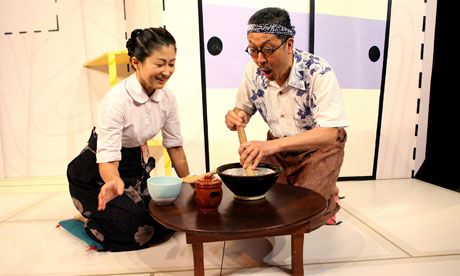Eiji Kusuhara obituary
Beguiling Japanese star of fringe theatre and popular television
- guardian.co.uk, Thursday 27 May 2010 18.58 BST
- Article history

Eiji Kusuhara in his last stage performance as Takezo with Noriko Sakura as Mitsue in The Face of Jizo (2007) Photograph: Tristram Kenton
He was born in Tokyo shortly after the second world war, a time when poor provisions and facilities meant that many babies died. Eiji was one of four children born to Ryoichi and Yasuko Kusuhara. Their first son died at three days old. Eiji was a weak, sickly baby and his parents waited to see if he would survive before they registered his birth. When Eiji was nine, his sister, Ikue, was part of a teenage suicide pact with her boyfriend.
Eiji was brought up in Hokkaido, where his father had a jewellery shop. He went to Iwamizawa East high school in Hokkaido before going on to study acting at Tama Art University in Tokyo. After graduation, he was a member of the Neo Literature Theatre company and then joined the Tokyo Kid Brothers. This company, formed by Yutaka Higashi in 1968, was part of the underground theatre movement and the style of rock music used in its shows was profoundly anti-establishment.
I first met Eiji in 1972 when the Kid Brothers brought their show The Moon Is East, the Sun Is West to London. The show appropriated western music culture with a maniacal energy and felt both familiar yet utterly strange. It was based on a 16th-century Chinese adventure story about a monk travelling to India looking for enlightenment. The show opened at the Oval House theatre in Kennington, then moved to the Royal Court and the Hampstead theatre.
Eiji subsequently joined Stomu Yamashta's Red Buddha Theatre for The Man from the East, a physical theatre show depicting episodes from Japanese life, ancient and modern, real and fantastic, with accompaniment from Yamashta and an ensemble playing electronic and traditional instruments. This popular show originated in Paris, played for a month at the Roundhouse in London, then toured Europe and the US.
In 1975 Eiji returned to Britain and joined my avant-garde theatre group, Lumiere & Son. He appeared in The Sleeping Quarters of Sophia, a play about split personalities, and delivered a succession of disciplined but eccentric performances for the company over the next 10 years. He was serious and focused in rehearsal, yet could be constructively unpredictable in performance. In Dogs (1976), Eiji played Edgar, a hapless immigrant entrapped by a murderous couple who are in thrall to Sadean aristocrats. The part required a comic but cowed quality that contrasted strongly with the violence Eiji summoned in Indications Leading to ... (1975), a tale of detection in which the detectives enacted the roles of both perpetrator and prosecutor.
In 1977, he was in the Royal Shakespeare Company's production of Privates On Parade by Peter Nichols, playing a spying communist servant. He worked for several other companies, including Oxford Playhouse, Bristol Old Vic, Yellow Earth, Polka Theatre and Amazonia, and was one of the founder members of Ichiza Theatre Company. His last stage performance was in 2007, in Hisashi Inoue's comedy masterpiece of Japanese postwar drama, The Face of Jizo, at the Arcola in east London. The play comprised conversations between a young woman who survived the atomic bombing of Hiroshima and the ghost of her father. The play shows the daughter's anguish that she survived but her father did not.
On television Eiji appeared in Doctor Who, Inspector Morse and in 17 episodes of the much-praised BBC series Tenko. Set in 1942 in an internment camp on a Japanese-occupied island, Tenko dramatised the experiences of British, Australian and Dutch women captured after the fall of Singapore.
During the 1990s, Eiji was a regular presenter on two Japanese TV programmes, Hello London and Living in England, in which his idiosyncratic, comic personality was given free rein. He had vast experience as a voiceover artist in both Japanese and English in film, TV, commercials and radio. He was the voice of the evil genius Dr Kamikazi in the animated TV series Robotboy and was particularly well known for his wild co-narration in the cult TV classic, Banzai, which invited viewers to place their bets on bizarre challenges, such as how long Mr Shake Hands Man would maintain a handshake with a procession of bemused celebrities. Eiji's enthusiastic commentary highlighted the programme's wackiness.
His film credits included small roles in The Elephant Man, Eyes Wide Shut and Topsy-Turvy, as well as many student films in which he appeared without taking a fee.
He is survived by his wife, the designer Kyoko Wainai, whom he married in 1992, and his brother, Yuji.
• Eiji Kusuhara, actor, born 2 January 1947; died 23 April 2010
- guardian.co.uk © Guardian News and Media Limited 2010
No comments:
Post a Comment